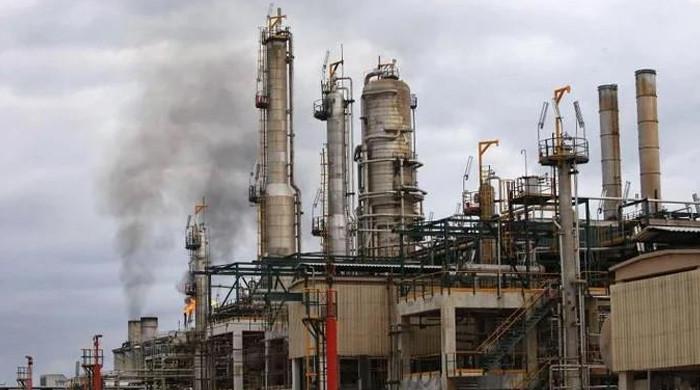Oil prices crash to 1998 levels, as storage concerns, economic woes amplify
Brent was down $1.62 (5.8%) at $26.46 a barrel by 12:11pm GMT, while the front-month May WTI contract fell $6.22 (34%) to $12.05
April 20, 2020

LONDON: Oil prices on Monday crashed to 1998 levels as worldwide economic woes amid the coronavirus crisis amplified and concerns arose that US crude storage will soon be full.
Brent was down $1.62 (5.8%) at $26.46 a barrel by 12:11pm GMT, while the front-month May WTI contract fell $6.22 (34%) to $12.05.
At one point, the contract hit a low of $11.04 a barrel — the lowest since 1998. However, analysts said the sell-off was exaggerated by the contract’s imminent expiry.
“The May contract is set to expire tomorrow and the bulk of the open interest and volume is already in the June contract,” said ING’s head of commodities strategy, Warren Patterson.
The spread between front-month contract and second month was more than $10 — the widest in history — as the June contract, which is more actively traded, fell $2.63 (10.5%) to $22.40 a barrel.
Many investors appeared to be misled by what appeared to be a low oil price, without taking into consideration the fact that the oil future contracts expire normally on a monthly basis, Commerzbank analyst Carsten Fritsch said.
The volume of oil held in US storage — especially at the Cushing delivery point for the US West Texas Intermediate (WTI) contract in Oklahoma — is rising as refiners throttle back activity in the face of weak demand.
“As production continues relatively unscathed, storage is filling up by the day. The world is using less and less oil and producers now feel how this translates in prices,” said Rystad’s head of oil markets, Bjornar Tonhaugen.
Oil in floating tanker storage is also estimated at a record 160 million barrels.
Weak global economic data also put pressure on prices.
The German economy is in severe recession and recovery is unlikely to be quick as coronavirus-related restrictions could stay in place for an extended period, the Bundesbank said.
Meanwhile, Japanese exports declined the most in nearly four years in March as US-bound shipments, including cars, fell at their fastest rate since 2011.
The mood in other markets was also cautious as the first-quarter earnings season gets underway. Analysts expect STOXX 600 companies to post a 22% plunge in earnings, which would represent the steepest decline since the 2008 global financial meltdown, IBES data from Refinitiv showed.
Halliburton Co — which generates most of its oil business in North America — joined its larger rival Schlumberger in taking impairment hits in the first quarter and issued a bleak outlook for North America.
Oil prices have collapsed by more than 60% since January to levels well below the costs necessary for many shale drillers to break even, leading to drilling halts and drastic spending cuts.
Canada — the world’s fourth-largest oil producer — has begun to rein in production but analysts say the biggest cuts lie ahead.











